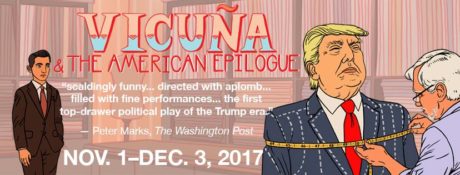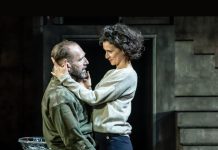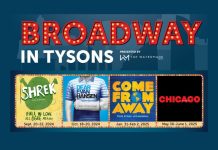Chances are you’ve seen him before, either as an angry Pakistani cook on Seinfeld or a benign Indian doctor on The Big Bang Theory.
That’s because Brian George – the character actor now dazzling audiences in the world premiere of Vicuña & The American Epilogue – has spent most of his 40-year career playing immigrants from the Indian subcontinent.
Now, if you hurry on over to the Mosaic Theater Company of DC, where Vicuña is enjoying an extended run, you can see him as a Jewish immigrant from the Middle East. Which, in real life, is exactly who he is.
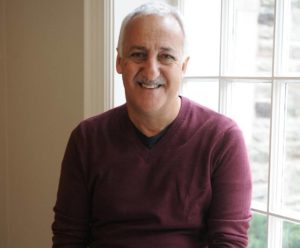
In the play, the immigrant is Anselm, a much sought-after custom tailor with an elegant workshop in New York. (Anselm happens to be Jewish, as is Brian.)
In an almost Faustian bargain, Anselm agrees, for an undreamt-of sum of money, to create a perfect suit, made of a rare fabric called vicuña, for a political pretender as brash as he is corrupt. The pretender, a real estate tycoon with despotic instincts, believes that if he wears such a suit, he can blind the American public and win the presidential election. (Any resemblance to current leaders is intended.)
I caught up with Brian George between performances and learned about some of the highlights of his career as well as what it was like to perform in Vicuña during the 2016 presidential election.
Born in Israel, to parents who were descended from Iraqi Jews, he and his family moved first to London, then to Toronto, where Brian attended university for a while, then dropped out to start a theater.
“We specialized in unpopular plays by famous playwrights – and failed miserably,” he said. He began taking improv classes at Second City and quickly joined the touring company. Comedy led inevitably to sitcoms, TV, and film.
His most famous role—and one still imitated far and wide – is that of Babu Bhatt, the furious Pakistani restaurant owner and chef on Seinfeld. (He rages at Jerry, whose neglect will cause him to be deported, with the memorable line, “You very bad man!”)
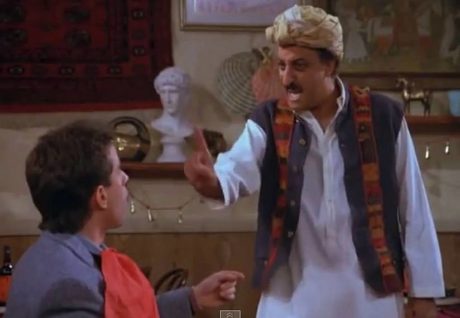
Although typecast for years as an immigrant from India or Pakistan, Brian also did his share of voice-overs, mostly as characters in superhero or sci-fi adventures. He’s been the voice of a Jedi in Star Wars, Professor Pyg (mimicking Alfred Hitchcock) in Batman and (my favorite), the zoo doctor in Penguins from Madagascar.
Brian started doing theater again with a production of Chuck Mee’s “A Perfect Wedding” and, a year later, David Hare’s “Stuff Happens,” both for the Center Theater Group in LA. He then moved on to a starring role in Yes, Prime Minister at the Mark Taper Forum in LA and the original, pre-Trump, version of Vicuña at the Kirk Douglas Theatre.
The play, as originally produced prior to the 2016 election, was meant to be funny. I asked Brian what it was like to perform in a comedy that’s no longer laughable.
“It was funny until the election, and then it wasn’t,” he said, adding that Vicuña was scheduled for a four week run from mid-October on. When the election came three weeks after the play opened, everyone was in shock. Audiences went from laughing uproariously at the sheer absurdity of a Trump-like character getting elected to total silence. “The performances after the election were brutal.”
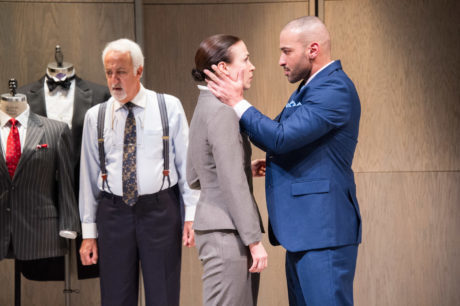
The current production, at Mosaic, is called Vicuña & The American Epilogue. Some people find it bleak. But to Brian, it makes sense.
“This vision – of the survivors huddled somewhere at the edge of the world – is a warning of the danger of demagoguery and its threat to democracy, which depends on trust and respect. If the press is denounced as ‘fake,’ then people can’t trust what they read. If judges are not independent, then justice itself is in question.”
Brian – who originated the role of Anselm – has incorporated into the character some of the traits of his own father, who was an Iraqi Jew brought up in India.
“My father grew up in a cross-cultural family. His half-sister, my aunt, is Muslim.” That relationship, he points out, is implicit in the father-son closeness that develops between Anselm and his young Iranian apprentice, who is, in fact, the son of his long-ago best friend.
Vicuña had its first staged reading at the Ojai Playwrighting Conference in California and Brian was hired to read the role of the Persian tailor. After the reading, he told Jon Robin Baitz [the playwright and Pulitzer Prize finalist] about his father. From then on, the character – whose religious identity is not indicated in the script – was not just Persian but a Persian Jew.
The reading was attended by producers from Center Theatre Group, in LA, and they booked the play on the spot. Robert Egan, who had worked with Baitz for more than 30 years, was – and still is – the director. He offered Brian the role.
“The play itself is a joy to perform,” Brian continued. And it’s a joy to watch, too. Don’t delay. There are just a few more performances before it closes on Sunday.
Vicuña & The American Epilogue plays through December 3, 2017, at Mosaic Theater Company of DC, performing at the Atlas Performing Arts Center – 1333 H Street NE, in Washington, DC. For tickets, call the box office at (202) 399-7993 ext. 2, or purchase them online.


